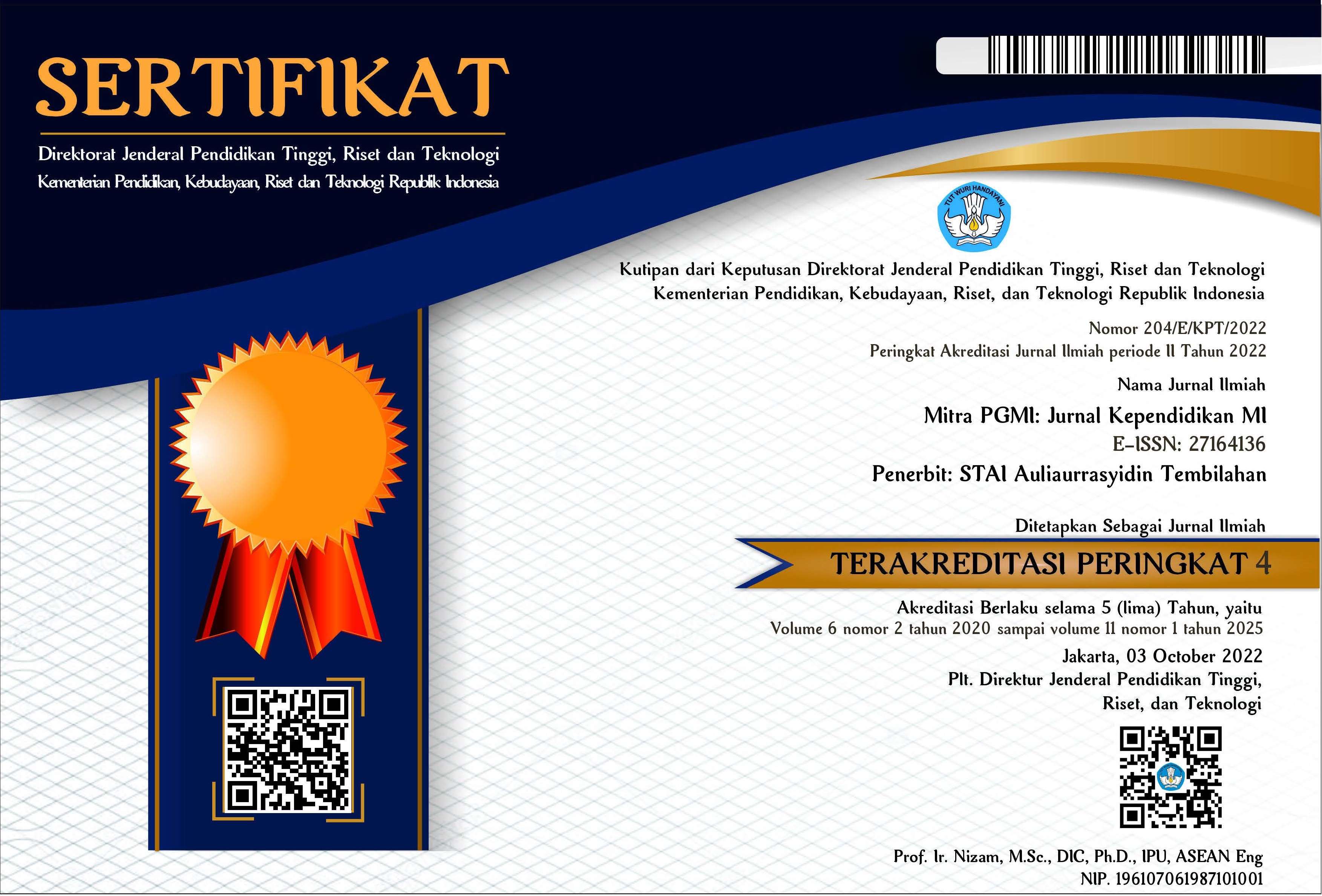Hasil Belajar Siswa melalui Penerapan Model Problem Based Learning di MIN 9 Banda Aceh
DOI:
https://doi.org/10.46963/mpgmi.v9i2.851Keywords:
Problem Based Learning, Learning Outcomes, CircleAbstract
In the Mathematics curriculum, the subject of circles is considered one of the challenging topics for students. Many students struggle with the application in daily life. One effort to address this is by implementing the Problem-Based Learning model in learning process. The aim of this study is to determine the learning outcomes of students through the Problem-Based Learning model, specifically in the subject of circles. This type of research is experimental. The learning outcome obtained through the Problem-Based Learning model wascompared to the mathematics KKM (Minimum Graduation Standard) score in the school, which was 80. The population in this research was all sixth-grade students of MIN 9 Banda Aceh, and the sample was 25 sixth-grade students randomly selected. The instrument used in this research was a test. Based on the evaluation results at the last meeting, the average student score was 87,1 with a standard deviation of 8,30. In the hypothesis testing, a right-sided t-test was used, with a significant level of α = 0,05. The calculation results showed that the implementation of the Problem-Based Learning model in the circle subjectin the sixth grade of MIN 9 Banda Aceh exceeds the KKM.
Downloads
References
Amir, M. (2010). Inovasi Pendidikan Melalui PBL. jakarta: Kencana Prenada media group.
Andani, M., Pranata, O. H., & Hamdu, G. (2021). Systematic literature review: model problem based learning pada pembelajaran matematika dasar. PEDADIDAKTIKA: Jurnal Ilmiah Guru Sekolah Dasar, 8(2) , 4040-417.
Arikunto, S. (2006). Prosedur Penelitian suatu pendekatan praktik. Jakarta: PT Rineka Cipta.
Eismawati, E., Koeswanti, H. D., & Radia, E. H. (2019). Peningkatan hasil belajar matematika melalui model pembelajaran problem based learning (PBL) siswa kelas 4 SD. Jurnal Matematika, 3(2) , 71-78.
Evi, T., & Indarini, E. (2021). Meta analisis efektifitas model problem based learning dan problem solving terhadap kemampuan berpikir kritis mata pelajaran matematika siswa sekolah dasar . Edukatif jurnal Ilmu Pendidikan, 3(2) , 385-395.
Hamzah, A., & Muhlisrarini. (2014). Perencanaan dan Strategi Pembelajaran Matetika. Jakarta: Raja Grafindo Persada.
Holisin, I. (2016). Pembelajaran Matematika Realistik (PMR). Didaktis: Jurnal Pendidikan dan Ilmua Pengetahuan, 7(30 .
Juliawan, G. A., Mahadewi, L. P., & Rati, N. W. (2017). Pengaruh model problem based learning (PBL) terhadap kemampuan pemecahan masalah matematika siswa kelas III. Mimbar PGSD Undiksha, 5(2) .
Kodariyati, L., & Astuti, B. (2016). Pengaruh model PBL terhadap kemampuan komunikasi dan pemecahan masalah matematika siswa kelas V SD . Jurnal Prima Edukasia, 4(1) , 93-106.
Muhibbin, S. (2008). Psikologi Pendidikan . Bandung: Remaja Rosdakarya.
Murdiana, I. N. (2015). Pembelajaran pemecahan masalah dalam pembelajaran matematika. Aksioma, 4(1) , 1-11.
Purwanto. (2010). Evaluasi Hasil Belajar. Yogyakarta: Pustaka Pelajar.
Rusman. (2012). Model-model Pembelajaran. Depok: PT Rajagrafindo Persada.
Saputro, B., Sulasmono, B. S., & Setyaningtyas, E. W. (2019). Peningkatakan Kemampuan Berpikir Kritis dan hasil belajar matematika menggunakan model PBL pada siswa kelas V. Jurnal Pendidikan Tambusai,3(1). , 621-631.
Zaduqisti, E. (2010). Problem Based Learning (konsep ideal model pembelajaran untuk peningkatan prstasi belajar dan motivasi berprestasi) . Forum Tarbiyah, 8(2) , 1818-190.
Downloads
Published
Issue
Section
License
Copyright (c) 2023 Uswatun Hasanah, Nida Jarmita, Silvia Sandi Wisuda Lubis, Nelliraharti Nelliraharti

This work is licensed under a Creative Commons Attribution-ShareAlike 4.0 International License.
Authors who publish with this journal agree to the following terms:
1. Copyright on any article is retained by the author(s).
2. The author grants the journal, right of first publication with the work simultaneously licensed under a Creative Commons Attribution shareAlike 4.0 International License that allows others to share the work with an acknowledgment of the work’s authorship and initial publication in this journal.
3. Authors are able to enter into separate, additional contractual arrangements for the non-exclusive distribution of the journal’s published version of the work (e.g., post it to an institutional repository or publish it in a book), with an acknowledgment of its initial publication in this journal.
4. Authors are permitted and encouraged to post their work online (e.g., in institutional repositories or on their website) prior to and during the submission process, as it can lead to productive exchanges, as well as earlier and greater citation of published work.
5. The article and any associated published material is distributed under the Creative Commons Attribution-ShareAlike 4.0 International License








2.png)


